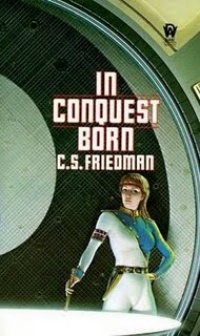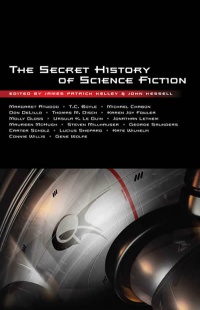The K’airth-v’sa — literally, “mate of the private war” — was as attractive to the Braxaná warrior as he or she was deadly. And it could be a woman. Yes, though years of male dominance had buried that fact. And if any woman deserved the title, this one certainly did.
Title: In Conquest Born
Author: C. S. Friedman
Year: 1986
Rating: 4 out of 5 stars
 I don’t often re-read books because there’s too much out there I haven’t read yet, and I don’t like to spend time retreading old ground. I pulled this old favorite out for a re-read for two reasons. First, I hadn’t read it since back in the 80’s. I recalled it as one of my very favorites, but my recollection was becoming hazy, so I wanted to see how it compares to my memory. (As it turns out, it’s not quite the masterpiece I remembered from my teen years, but it’s still a very strong novel.) Second, I only recently noticed that Friedman wrote a sequel which was published a few years ago (The Wilding, 2004), so before reading that I needed to get back up to speed.
I don’t often re-read books because there’s too much out there I haven’t read yet, and I don’t like to spend time retreading old ground. I pulled this old favorite out for a re-read for two reasons. First, I hadn’t read it since back in the 80’s. I recalled it as one of my very favorites, but my recollection was becoming hazy, so I wanted to see how it compares to my memory. (As it turns out, it’s not quite the masterpiece I remembered from my teen years, but it’s still a very strong novel.) Second, I only recently noticed that Friedman wrote a sequel which was published a few years ago (The Wilding, 2004), so before reading that I needed to get back up to speed.
In Conquest Born is a tale of obsessive personal vengeance set against the background of a never-ending war between two divergent branches of humanity. Zatar is a Braxaná, one of the ruling class of the Braxin Holding. Braxin society is male-dominated, racially segregated, highly warlike, and regards cruelty and hatred as virtues, the softer emotions as disabilities, and barbarism as a desirable aesthetic value. The Braxaná are their rulers, a different racial strain that perpetuates an image of superiority over the masses. They have almost unlimited power — they can put ordinary Braxins to death on a whim, take over command of military fleets, or raze entire planets that oppose them. Their philosophy might be summed up like this:
We recognize that in man’s nature there is a drive to oppress others, be they truly alien or his own women. Perhaps the true measure of his power is how openly he can indulge in this.
Anzha lyu Mitethe comes from the Azean Star Empire, perpetually at war with the Braxins. The Azeans pride themselves on their egalitarian society with total equality between the sexes, so different from their enemies. The Azeans put more emphasis on the mind than on brute physical force; over the generations, through their understanding of genetics and a program of breeding, they have produced a small population of telepaths. This is one of their prime tools in the war, to the disgust of the Braxins, who see psychic ability as an abomination. As a child, Anzha witnesses the death of her parents, in a particularly gruesome manner, at the hands of Zatar. Her desire for vengeance will change the very course of the war. And she just happens to be the most powerful telepath to come along in a long long time.
The personal vendetta between these two is the fuel that drives the story, and it’s fascinating to follow the course of their rise to power as a means of pursuing it. Interestingly, they eventually come to feel more connected to each other than to others of their own kind. Both are misfits in their own way, trying to find a way to succeed in the societies into which they are born.
Those societies themselves are also an interesting study. On a surface level, Friedman sets them apart visually: the Braxins are white-skinned and dark-haired and of medium height, while the Azeans are tall, golden-skinned and white-haired. But it immediately becomes clear that these are not white and black hats to distinguish the “good guys” from the “bad guys.” These two societies certainly see themselves differently, but at heart they both fall prey to the same kinds of flaws. The Braxins openly practice discrimination based on sex, class, and race, but the Azeans are really no better. Azea long ago decided on their ideal physical form, and babies are genetically manipulated so as to match that ideal. In fact, it’s a requirement for citizenship — one which Anzha doesn’t match and must struggle against. Their practice of racial conformity is no less repugnant than Braxin practices. I suppose the point is that every culture has problems, no matter how self-righteously it views itself.
This is a very enjoyable novel, and I’m looking forward to seeing what the sequel has to offer. Friedman is a highly capable writer whose output has been less than I could wish for; but given a choice between quality and quantity, I’ll take quality, and fortunately Friedman provides it.















I’ve never read anything before by Friedman but this looks like an interesting book that I’d like to try. Thanks for the review!
Simcha
Have you read her fantasy books? The When Night Falls trilogy is one of my favorites.
If you mean the Coldfire Trilogy, yeah those are awesome.